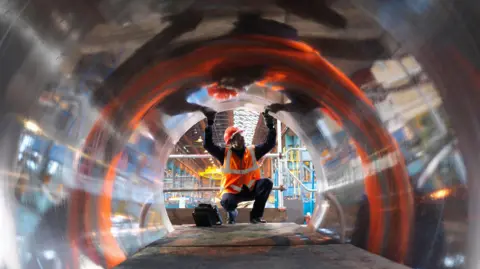 Getty Images
Getty ImagesThe UK will not retaliate immediately to the renewal of steel and aluminium tariffs by the US, the BBC understands.
Many in the industry are calling on Britain to join the EU and Canada who have said they will hit back against the policy announced by US President Donald Trump on Monday.
The tariffs, set to apply from 12 March, would mean any steel or aluminium coming into the US would be subject to an import tax worth 25% of its value.
Government sources told the BBC “retaliatory tariffs may not be in the best interest of the industry”. The Conservatives accused Labour of failing to engage with the US on the issue.
Speaking in Parliament, Trade Minister Douglas Alexander said “what British industry needs and deserves is not a knee-jerk reaction but a cool and clear headed sense of the UK’s national interest based on a full assessment of all the implications of the US’s actions”.
However, shadow trade minister Harriett Baldwin said it was “a moment of great peril for the UK steel industry because the UK has failed to engage with gusto with the new US administration”.
Liberal Democrat Leader Ed Davey urged the government to show “urgency” in dealing with the issue and protecting jobs.
UK ministers will meet the steel industry and unions later on Tuesday and visit key steel companies later this week.
The UK’s direction of travel on tariffs in general appears to be a clear attempt to differentiate it from other G7 allies’ attempts to project strength to the White House.
Prime Minister Sir Keir Starmer’s spokesperson declined to say whether Trump was wrong to impose the tariffs.
“We will take a considered approach to this. We will engage with the US on the detail, but the government is clear we will work in our national interest and this issue is no different to that,” the spokesperson said.
Tariffs are paid by companies buying from overseas, not to the overseas companies selling to them.
The importing company may choose to pass the cost on to customers directly or to absorb the cost themselves, or simply to reduce imports. Foreign exporters could also decide to cut their prices to protect sales.
Trump introduced similar steel and aluminium tariffs in 2018 during his first term, but many countries, including the UK, were later able to work out exemptions.
The US accounts for about 10% of the UK steel industry’s exports, but for some suppliers of speciality products it is much more important than that, making up a large proportion of their overall business.
‘Respect and understand’
The government’s comments on Tuesday echo similar statements made by senior figures from Monday.
Chancellor Rachel Reeves told Matt Forde’s The Political Party podcast that she “strongly believe[s] that a deal can be done” on tariffs.
Asked if the UK would introduce tariffs in response, she said: “I don’t believe in tariffs. I don’t want to see more tariffs.”
And UK ambassador to the US Lord Mandelson has said the UK must “respect and understand” Trump.
Trade body UK Steel said on Monday that any US tariffs would be a “devastating blow” to the UK industry.
“President Trump has taken a sledgehammer to free trade with huge ramifications for the steel sector in the UK and across the world,” the group added.
Unite, the union representing UK steel workers, said Trump’s announcement “should be a wake-up call for this government”, calling on it to buy more UK steel in response.


